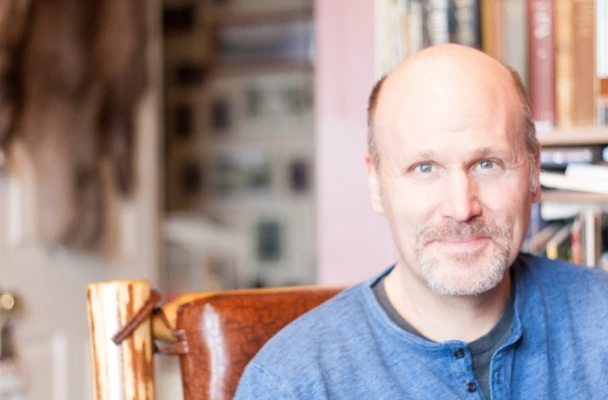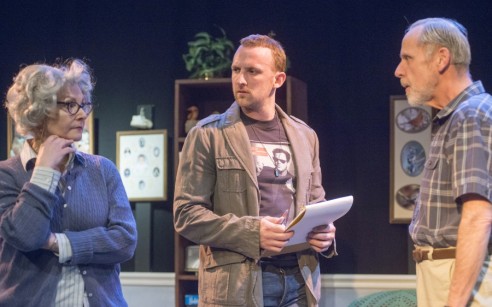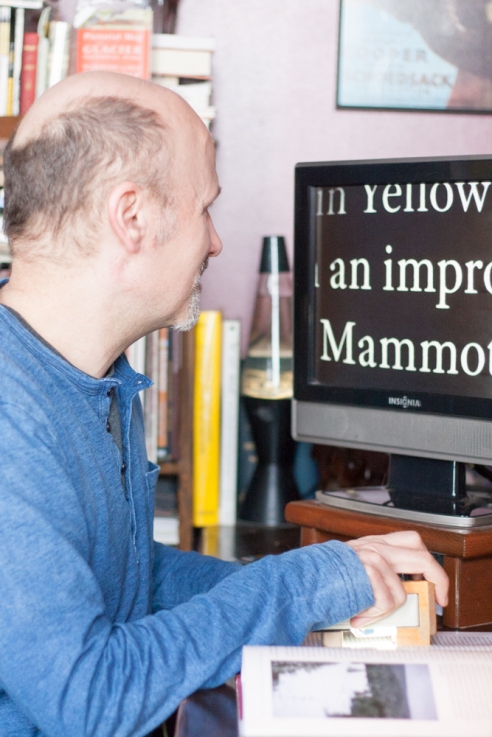Dream comes to fruition for playwright Todd Bauer

Photo by Megan Boguszko.
Chicagoan Todd Bauer didn’t start writing until after he graduated from college with a degree in accounting, and didn’t share his writing for more than a decade after that. Now 49, Bauer is finally comfortable calling himself a playwright just days away from the opening of his first full production, “The Bird Feeder Doesn’t Know,” set to open April 6 at The Raven Theatre.
The play is a universal story of a family — aging parents Herman and Ingrid, played by Chuck Spencer and Sheila Landahl, and their disabled son Everett, played by Joshua Volkers. The story is set in 2006 but spans several years, using flashback scenes to give background, and tackles a common theme faced by many families — as Everett, who has learned to live with his disability, tries to get his parents to accept their declining physical abilities, among several other themes. Directed by Jonathan Wilson, it runs through May 16.
Perhaps Bauer needed the validation of a full production to call himself a playwright without hesitation, although by most definitions he’s been just that for some time now: “The Bird Feeder Doesn’t Know” may be his first full production, but he’s written several plays; he’s an ensemble member of the New York-based Apothetae company; his play “Downsizing Camus” received staged readings in Washington, D.C. and in New York City; and he’s taught British and American drama at the Newberry Library since 2002. He was awarded an NEA Challenge America Grant and a fellowship from the Ragdale Foundation in 2009. And, there is one more thing that Bauer likes to point out, perhaps most importantly, as it has shaped who he is both inside and outside the theater — Bauer is blind.
At the age of 8, Bauer was diagnosed with a form of Macular degeneration and over time his eyesight has degenerated to a point to where he is now legally blind. He points it out, not for pity or for a pat on the back, but to spread awareness for the disabled. And while “The Bird Feeder Doesn’t Know” features a character with a disability, one doesn’t come away from the play describing it as a play about someone with a disability, just as one wouldn’t use Bauer’s disability as the lone way to describe him.
He grew up in Cincinnati and attended Miami University in Ohio, where he majored in accounting in order to have stability and independence. He moved to Chicago in 1988 after graduating and getting a job in accounting, but quickly discovered that he needed something more than his “day” job to feed his passion.
We met Bauer and his wife of 14-years, Julia, at their Northwest side home recently. There, Bauer talked about how he found his passion and what finally got him to take a risk and share his work after more than a decade of writing. He also chatted about the craft of playwriting and about “The Bird Feeder Doesn’t Know.”

Sheila Landahl, Joshua Volkers and Chuck Spencer in Todd Bauer’s “The Bird Feeder Doesn’t Know.” Photo by Dean La Prairie.
Interviewed by Bob Chiarito for The Chicago Ambassador.
CA) How many plays have you written now?
BAUER) I have five plays that I feel comfortable giving to a theater. I probably have another five plays that I have written as I was learning the craft, that I haven’t read in years. If I looked at those I’d probably throw them away or they’d need a lot of work.
CA) I was a little hesitant to mention that you are blind but it seems that it’s such a big part of who you are and your work.
BAUER) I wouldn’t say it’s part of my mission, but one thing I want to come out of this – when the Raven Theatre first put out their publicity it said ‘Todd Bauer, playwright’ and I said ‘no, you have to put blind playwright.’ Part of the reason people do hesitate to talk about it or whatever is that implicit in that there’s something wrong. I think that’s society’s issue and the way we communicate that issue is by putting ourselves out there, showing how rich our lives are, how capable we are. Yes, we’re different, and we have a long way to go, but when people people see that, it’s not something to view as something wrong, it’s just different. Then I think people won’t hesitate to talk about it.
CA) It seems like a lot of things in “The Bird Feeder Doesn’t Know” are autobiographical. I saw something where you spoke and said that you were encouraged to major in accounting in order to get a stable job and keep your independence. In the play, there’s a scene between Everett and his mom Ingrid and she isn’t too thrilled with his wanting to switch majors in college.
BAUER) I never had a conversation like that with my parents. They never came out and said ‘You can do this, you can’t do that.’ I do think it was kind of implicit, coming from a place of them wanting to do what was best for me, and given my eyesight the best thing would be a safe major. The way my college experience was at Miami of Ohio, the first two years you took almost everything and then in your third year almost all my classes were accounting. I knew right away this was not for me, but I stuck with it, partially because of all the practical reasons and partially because it was a lot easier for me with my eyesight than reading books, reading novels, so I had a lot more time to party. (laughter). That was a part of it, but then when I got a job in accounting, literally within hours I was like ‘I have to figure something else out or I will go crazy.’
CA) Where was your first accounting job?
BAUER) I worked two years with a Big Eight accounting firm, back then it was the Big Eight, Touche Ross, which is now part of Deloitte & Touche. I got laid off after two years. One of my clients was the City of Chicago. I was auditing them and I looked at them — and when you work for a Big Eight accounting firm, you don’t leave until the work is done. Long hours, high pressure and all that, and I looked at the City of Chicago and shit could explode and they are out the door at 4:30. I thought If I have to do accounting, this is where I want to do accounting (laughter). People always ask me, ‘What do you do for the City of Chicago’ and my response is always ‘As little as possible.’ And on a slightly more serious note, when I talk to younger artists …. anybody that pursues the arts, you’re going to have to do something else. I think it’s basically a myth that you’re going to make your living by your art. Yeah, there’s a select few that everybody knows about but it is such a select few. So I tell people that you basically have a choice. You can basically do nothing but theater and you’re going to be living on flour to eat and living in a basement apartment or you can get a somewhat normal job and take a bite out of your leisure hours and do everything on the side or somewhere in the continuum in between. For me, given my personality, the City is perfect because it gives me a lot of stability. Yeah, it’s a 40-hour work week, but it’s still conducive to writing.
CA) I read that you were basically writing on your own and not showing anything to anyone until you signed up for a National Theatre Workshop of the Handicapped. What year was that?
BAUER) That was 1999.
CA) So you went 10 or 11 years without showing anyone anything?
BAUER) Yes. And what I did at first as soon I became an accountant, I thought back to undergrad, and I always liked theater but it was so foreign to me that I didn’t even think about pursuing it. It was so foreign and unknown and I had no idea how to go about doing that. I thought back to undergrad and my favorite class in undergrad was a philosophy class that I took. I thought about putting things in motion to get a Ph.D. in Philosophy so that I could teach, so I started taking all these classes at DePaul. That eventually got me to a point where I felt comfortable applying to a Masters Program in Liberal Studies at Northwestern. It was an interdisciplinary program and one of the classes that I took was a modern British drama class, that kinda re-awoken things. I always liked theater, I went to theater as soon as I moved to Chicago. Interestingly enough, the first play that I ever went to in Chicago was at the Raven Theatre, so it’s very poetic that the first full production that I ever get is at Raven. So that class reawakened it, but I wasn’t doing it much, (writing on the side, not showing it to anybody.) Through a blind services association newsletter, I saw that these recruiters were coming for the National Theater Workshop of the Handicapped. I didn’t know a thing about it, and at that point didn’t have any real theater background, it was like a hobby. But I went and the two recruiters were two of the hottest women I had ever seen (laughter).
CA) You were able to see enough to know that?
BAUER) As far as I could tell (more laughter).
CA) You said this is your first play, but you’ve had others…
BAUER) First full production. The four stages of a play are you write a play, and the first real thing is a table reading, where actors sit around a table and read it. The next step is called a stage reading, and typically there’s six hours of rehearsal, it’s the first time a director is involved, and it’s in front of an audience. Then the next phase, which is very rare, because you’re starting to talk about time and money, is a workshop production, which I did have with this play at Raven Theatre. That can really vary in terms of length of rehearsal and what they end up doing. The workshop at Raven consisted of three or four weeks of rehearsal, the actors did get off book so they memorized the lines. It essentially was a production without a set, without any tech stuff, no costumes. But you got to see the play on its feet. It was performed four times. And then the final step is a full production. I’ve had a lot of the other stuff but in terms of a full-on production, this is my first one.
CA) Is there one of your plays that’s more autobiographical than another?
BAUER) I don’t know, they all have aspects. I think what happens with a play is that you take things from your life, like this play — I have a disability, I have aging parents. But then you take that and extrapolate for dramatic purposes. Really, the cool thing that happens with a play is that you sit down and you think you’re going to write this play about this and this stuff is going to happen but you really know things are going well when the characters start to take over. Also, the play may go into a different direction than where you thought it was going to go and that’s a really cool feeling. Early on, at least for me, sometimes you try to control that more. But now, it’s like ‘if this is where the characters are taking it I think we need to go with this.’
CA) Do you discover that by sitting back and having others read it?
BAUER) It’s all a process. Some of that happens when you’re writing on your own. A lot of it happens in feedback. Feedback is so important and I’ve been blessed to have other playwrights involved with developing my work. Since 2000, I’ve been involved in the Artist Development Workshop which is part of the Access Project at Victory Gardens, which is a weekly workshop for people with disabilities or people writing work about disabilities. A lot of time the feedback you’ll get is ‘well, that didn’t seem right for that character’ and then when you look at it you’re like ‘yes, that’s my voice, the playwright’s voice. That’s not the character’s voice.’
CA) There are a few things that I thought might have been drawn right from your life in the play
BAUER) Let me ask you, why are you interested?
CA) I’m interested personally because I think it’s cool that somebody is following their passion despite the fact that they have to work a day job. That, I can relate to.
BAUER) I was asking more specifically why are you interested in the autobiographical stuff in the play? Let me tell you why I’m a little resistant.
CA) I don’t want to give spoilers.
BAUER) It’s not even that, it’s more like that I don’t want people coming into the play… I think that pollutes people’s experience of the play. Then it’s in their head like ‘this is autobiographical, this is not.’ I think it’s much more interesting for someone just to experience the play and what should be important in that is their response to it, not where I factor into it. So, I think I’m not going to talk about that because I don’t want to pollute people’s experience. I think any artist begins with autobiographical things and it goes on from that.
(At this point, Bauer’s wife Julia, who is seated at the table with him and a reporter, chimed in and mentioned that the play touches on many universal themes)
BAUER) I have heard so many times, and this is the highest compliment I can get on this play. So many people have seen it and said ‘that’s my family.’ That has happened so many times, and that tells me that this isn’t a play about my family, but it’s a play about family and that’s something that everyone can relate to.
CA) Like I said, I don’t want to give any spoilers, but do you think Herman’s action at the end could be seen as a sacrifice for his son?
BAUER) I think that’s a legitimate thing. I wouldn’t say it’s the only response but I think there’s evidence. My thing would be, what’s most important, is what’s your response? I don’t want to tell anybody how to interpret or respond to this play. What I have to say is in the play and that’s it. I think it’s much better to let people have nothing else in their head and just respond to the play.

Sheila Landahl as Ingrid and Chuck Spencer as Herman in “The Bird Feeder Doesn’t Know.” Photo by Dean La Prairie.
CA) It was interesting, the parents were so conservative and Herman, the father, he didn’t even know — he knew his son was an artist and had some passion, but didn’t know what type — that scene where he asks him what type of camera he uses.
BAUER) That’s a perfect example and I’m sure it’s universal. Parents just don’t know their kids as much as their kids would like them to know them. And they often see in their kids what they want to see rather what is actually there. That’s no knock on parents or kids, it’s just I think the way a lot of families are. It’s part of the dynamic.
CA) As for the character of Everett, I don’t know if you’d call it a compromise, or just being practical. At least he’s able to keep his foot in the art world by working as a graphic designer. It’s like if I can’t work as a reporter, at least I can do PR.
BAUER) Yes, and so many people in the arts, that’s how they end up doing what they are doing. My wife is an editor and my guess is that there are a lot of people who wanted to be writers or wanted to be editors on the great American novel but they end up editing for whatever.
CA) It’s interesting also and it’s addressed late in the play, how Everett calls his parents by their first names. What was your motivation behind that?
BAUER) It’s a dramatic device. What it is, I have 90 pages to convey to an audience who has never met this family before, everything about this family. So you make choices in order to convey as much and as economically as you can. So what does that say to someone when their child is calling their parents by their first names? I think what it says is that they are not that close. Certainly not that close emotionally, so that’s why I made that choice. There’s a moment in the play, and if people think back on it, we see the moment where for the first time he calls his parents by their names instead of mom and dad. A lot of people the first time through might not get that but if they look back on it or love it enough to see it again, then they’ll get it. There’s a lot of things like that in every play. My director, Jonathan Wilson, who is just phenomenal, he talks about plays and says ‘good plays, every time you get through a layer and understand a play on this level another level opens up and that never ends.’ It’s like people, you keep finding another layer.
CA) Have you started on anything new?
BAUER) I just now have a play that is definitely ready for a table read and will have a stage reading at the Newberry Library in late summer or early fall. I know what my next play is going to be, my next brand new play. (Later in our interview, Bauer said the setting for his recently completed play is the back-country of Glacier National Park in Montana, where one day Bauer and his wife plan to retire).
CA) Do you work on them one at a time?
BAUER) I’ve gotten to the point, luckily, where I don’t have that luxury. I think it’s really helpful and keeps the creative juices flowing by switching from one to another.
CA) I heard you say that finding your passion for writing just caused you to hunger for more. Is that still the case?
BAUER) Yes, it’s still the case but I have to tell you, working a full-time job and then rehearsing until 11 p.m. six nights a week, I’ll be very happy once I have more nights at home than away.
CA) If someone meets you on the ‘L,’ some stranger, how do you describe yourself?
BAUER) That’s funny, for a long time I really had a problem saying that I was a playwright. I had this long, crazy story, ‘Well, I work for the City but I do this…’ and it was kind of stupid. Now I actually say ‘I’m a playwright’ and I still have a little trouble owning that, but I am a playwright. And like I said, other than that .1 of one percent, everybody who is a actor, director, painter, novelist, they are doing something else besides that. So if you ask one of them, they will say ‘I’m an actor’ even though they work at Starbucks or wherever. It was a process for me, but obviously when you get a validation like a full production, it’s a lot easier to whole heartedly say ‘I’m a playwright.’
CA) Most people may not be aware that most playwrights and novelists do something besides that.
BAUER) Most people aren’t.
CA) They may think if you’re not a star, or that because you have to work another job, it’s a negative.
BAUER) Right. Also, the other thing that I’ve found is that whatever you are doing when someone comes into your life, no matter what you go on to do, that’s kind of how they always view you — by what you are doing when they first got to know you. That’s not a criticism, it’s just a reality. It’s interesting, the people who have come into my life since I’ve gotten into theater see me as a theater artist more naturally than people who go all the way back to (my early accounting days).
CA) Do most of your colleagues know that you’re a playwright?
BAUER) No, not really. I don’t keep it secret but there are only two people that I do things socially with (from my day job). So, ninety-nine percent of the people I work with have no clue. Part of it, and I may be wrong, is that I don’t think they are theater people, they just aren’t interested.
The thing everyone should do in life is follow your passion. If your passion is to be an accountant, be an accountant. If your passion is to be a theater major, I don’t mean don’t do anything besides theater because that could be a really rough life, but make sure you do what it takes to be a theater artist. I think the problem is, and what I was dangerously close to, is that my true self was not an accountant and that’s the route I started off on. I did something about it and I went about it my way, at my pace, and that’s why this is really a tremendous moment for me.
CA) You took action, you didn’t just write. You could have kept writing forever…
BAUER) That’s another good point. I firmly believe this, the risk to reward is directly proportional in life. No matter what your path is, at some point you have to take a risk. For me, there were many along the way, but that one (attending the National Theater Workshop of the Handicapped) was the biggest because I really didn’t know much about that place. At that point I remember that I only had three weeks of vacation and had to use two of them to attend. I didn’t know anyone else going and had never done anything full-on artistic. I think that was also the beginning of me coming to terms with my disability. I was always able to play it down and deny it, so to be in this world with all disabled people, where it is always out there and in the room, it caused me to look at it. I also met some people who are still dear friends as well as the person who is the most important mentor I ever had, Krista Smith, from going out there. If I hadn’t taken that leap, I guarantee you this play wouldn’t exist right now.
CA) Your bio on your website says your childhood home was destroyed by a tornado, you’ve been evacuated for a hurricane and stranded by an volcano eruption. Is that a message that basically says ‘I’ve weathered the storm?’
BAUER) I have no idea. I’ve had all those experiences. To me, that’s the whole point. Having as much of an experience being alive as you can. Not that all those experiences were pleasant. They certainly were stressful, but it’s great to experience those sorts of things.
CA) It makes you who you are.
BAUER) Exactly.
“The Bird Feeder Doesn’t Know” runs through May 16 at The Raven Theatre. For more information or tickets, click here.
Be sure to “Like” us on Facebook!



Leave a comment